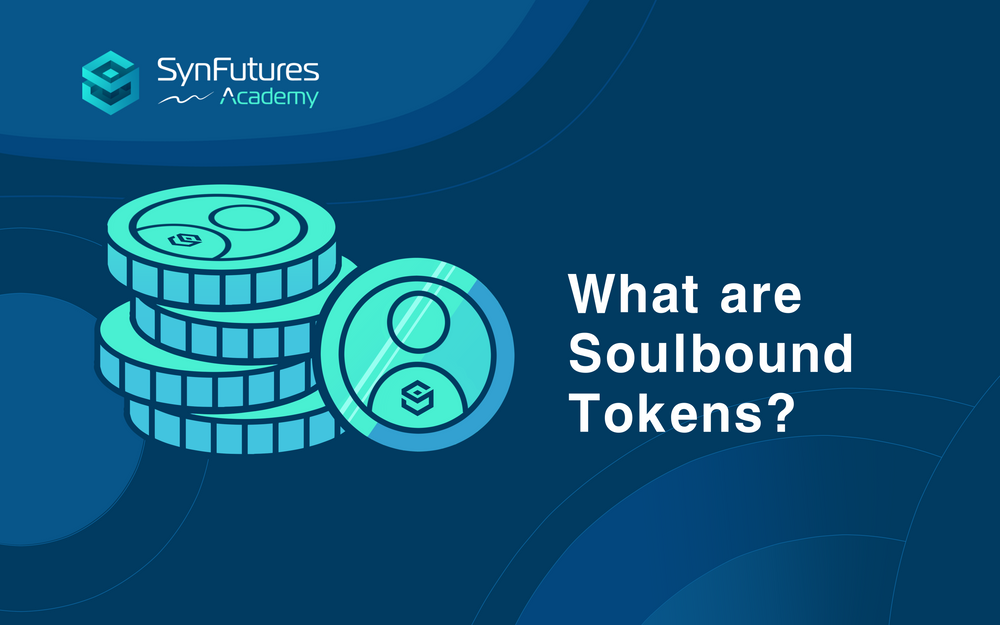What are Soulbound Tokens?
Key Takeaways
- Soulbound tokens (SBTs) are non-transferable NFTs that enable users to have a decentralized identity tied to their wallets.
- Soulbound tokens enable applications like scam prevention, wallet recovery, Sybil-resistance governance, and decentralization framework.
Background
Vitalik Buterin, one of Ethereum’s co-founders, recently co-authored a paper titled “Decentralized Society: Finding Web3’s Soul”. The paper centered on the encoding of social relationships of trust to establish provenance and reputation in web3. The authors propose a novel primitive dubbed soulbound token (SBT) to establish trust within the web3 ecosystem without giving up the virtues of web3.
Soulbound tokens (SBTs) extend the potential of digital sociality and establish users’ digital identities by aggregating tokenized social interactions, allowing for the emergence of new and advanced applications.
What are they?
Soulbound tokens (SBTs) are non-transferable NFTs that enable users to have a decentralized identity tied to their wallets. These can be viewed as achievement cards representing holders' connections and history to specific events. Soulbound tokens are akin to unique documents like birth certificates, education certificates, and job records.
How do they work?
A commonly discussed use case of non-fungible tokens is the on-chain representation of unique items like certificates. However, the ability to transfer NFTs makes that unfeasible as it lowers the barrier to ownership of these items. For example, a user may buy an NFT of a Yale university diploma to claim alumni membership – effectively undermining the time and effort taken to achieve that certificate.
Soulbound tokens resolve this challenge using a merit scheme – users must earn an SBT. In the above example, Yale “Soul” (Yale’s wallet) would have to issue the user's “Soul” (user’s wallet) an SBT of a certificate that can prove alumni membership.
Soulbound token issuance is a one-way transaction between two souls (wallets) – the issuer and the receiver. A soul (wallet) is a repository of several SBTs, which collectively define and prove the user’s identity. Users retain the option to revoke their SBTs upon request.
What are the core use cases?
Soulbound token incites several extensive applications that could significantly improve user experience and bring web3 closer to global adoption. Some of these applications include.
Scam prevention
Web3 is rift with so many malicious actors pretending to be legitimate players to exploit unknowing users. The growing number of rug pulls and ghost participants necessitate the creation of a robust anti-scam system. Soulbound tokens finely check this box. The ability to quickly verify the legitimacy of any user’s identity and gauge their reputation mitigates the risk of false claims that usually lead to exploitation.
Wallet recovery
One of the biggest hurdles curtailing web3 adoption is security management. There is a hanging fear of losing all users' assets in a simple misstep. To solve this challenge, Vitalik proposed a social recovery functionality that executes in the event of wallet loss.
The mechanics involve users appointing individuals or institutions as “guardians” of their wallets. These guardians watch over the private keys of the wallets. Should the wallet get compromised, the user merely has to reach out to the guardians to sign a unique contract to change the signing public key attached to the wallet to a new one.
Wallet owners can always add or remove guardians. And as noted by Vitalik and associates, soulbound tokens enable soul owners to have guardians from off-chain relationships such as an employer, family, club members, etc., and on-chain relationships such as decentralized autonomous organization's partners.
Sybil-resistant governance
A Sybil attack is a malicious occurrence where an attacker undermines a network by creating several fake identities to control a disproportionately large amount of influence over the network. The current system of governance where voting rights are distributed to arbitrary network participants in the form of tokens is susceptible to Sybil attacks as any user or small group of users can create multiple wallets to monopolize the network.
Soulbound tokens can be used to mitigate such attacks by issuing voting rights based on individual credentials such as certifications, licenses, or work documents. Additionally, voting rights can be issued as “proof-of-personhood” SBTs.
Mechanisms for decentralization
Without the ability to transfer SBTs to other wallets, the probability of power accumulation is drastically reduced. Whales and retail investors are forced to operate with similar capacities on the network, thus shifting the network from the dominance of whales to a more equitable system.
Fostering novel markets and products
One pocket of decentralized finance that stands to richly benefits from soulbound tokens is the lending market. The accountability SBT brings on-chain could allow lending protocols to offer more products like under-collateralized and uncollateralized loans.
Relevant credentials in SBTs can be used as good account history and reputation for issuing loans and tracking repayment. Bad actors who attempt to abandon their indebted wallets risk losing their reputation and other associated privileges. Such products put decentralized finance on the heels of centralized finance and bring web3 closer to broad adoption.
Final Thoughts
The prospect of the Soulbound token cannot be overstated. The ability to carry out proof-of-identity on-chain unlocks several application layers that can significantly improve the user experience of web3.
The two main criticisms of soulbound tokens center on dealing with lost SBTs and privacy.
- What happens to a user's SBTs if the soul (wallet) is compromised or lost?
- How can users' privacy be guaranteed if a trail of the real-world identity is brought on-chain?
The first challenge can be resolved by the social recovery model proposed by Vitalik. As discussed earlier, this enables the recovery of web3 wallets by appointing guardians to serve as backup keys.
Lastly, it is common knowledge that web3 adoption's key drivers include privacy, security, and equity. Therefore, it makes sense that such primitive cannot rise to mass adoption if it does not conform to the ethos of web3.
Discover SynFutures' Crypto Derivatives products: www.synfutures.com/.
Disclaimer: SynFutures Academy does not guarantee the reliability of the site content and shall not be held liable for any errors, omissions, or inaccuracies. The opinions and views expressed in any SynFutures Academy article are solely those of the author(s) and do not reflect the opinions of SynFutures. The SynFutures Academy articles are for educational purposes or information only. SynFutures Academy has no relationship to the projects mentioned in the articles, and there is no endorsement for these projects. The information provided on the site does not constitute an endorsement of any of the products and services discussed or investment, financial, or trading advice. A qualified professional should be consulted prior to making financial decisions.




